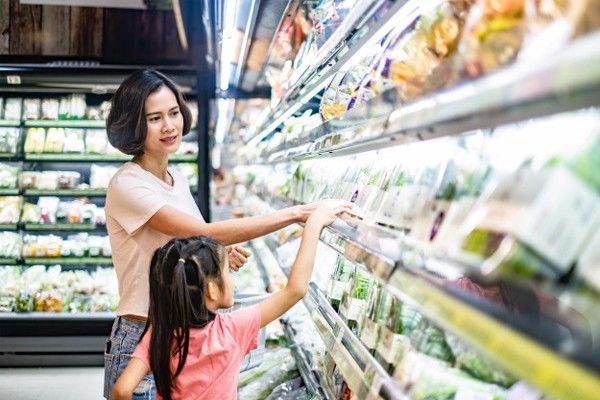Front-of-pack labeling on food items can help curb diabetes in Filipino children

MANILA, Philippines — On the back of every commercially available food item that is up for sale, a label that indicates its nutritional information, including sugar, salt and fat content, can be found. This is a requirement. But there is a call for the label to be moved to the front of the package, made by the Healthy Philippines Alliance (HPA).
A network of civil society organizations fighting for non-communicable diseases (NCDs) prevention and control, the HPA believes that mandatory front-of-package labeling (FOPL) on food products in the Philippines is a step to encourage healthier eating among children and protect them from the risk of developing diabetes.
The call was made in line with World Diabetes Day and the commemoration of National Children's Month last November. This year’s theme, “Healthy, nourished, sheltered: Ensuring the right to life for all,” highlighted the crucial role of health care, nutrition and shelter in the lives of children.
Through its partner, the Rainbow Camp Foundation Philippines, which is dedicated to assisting young people with diabetes, the HPA pushes for FOPL, believing that it can successfully educate parents and their children to avoid food high in sugar, salt, or fat and, in turn, help them adopt a healthier diet.
Unhealthy eating, paired with physical inactivity, leads to obesity and being overweight, which are major risk factors to diabetes, the Rainbow Camp Foundation Philippines said.
"At a certain age, children are independent enough to decide how they spend their baon or allowances. With warning labels at the front of food packages, children can make smarter food choices to buy and eat healthier snacks or lunches. Let's help our children take charge of their health while they're young so that they can stay away from NCDs like diabetes," said Dr. Elizabeth Ann F. Catindig, camp director of Rainbow Camp Foundation Philippines Inc.
Based on the Diabetes Report 2000-2045, the Philippines had 3,900 cases of Filipino children aged 0 to 19 with type 1 diabetes, also known as juvenile or childhood-onset diabetes, in 2021.
The United Nations Children's Fund (UNICEF) study in 2022, “Children’s Lived Experiences of the Food Environment,” reported an unhealthy food environment in the Philippines that is causing a rise in the prevalence of overweight and obese children.
The study showed 74% of children aged 13 to 15 eat less than three portions of vegetables per day, while 38% drink at least one soft drink per day. Hence, overweight Filipino children aged 5 to 10 rose to 14% from 10.4% in 2019.
Among adolescents aged 10 to 19, overweight rates increased to 13% from 10.7% in 2019. This is consistent with data from the Department of Science and Technology-Food and Nutrition Research Institute (DOST-FNRI) in 2021, which recorded 27 million Filipinos were overweight or obese, while 3.6 million were 0 to 19-year-olds.
"The time is ripe for the Philippines to adopt an FOPL policy for packaged food that will foster healthier children and families and will help reduce prevalence of overweight or obesity as well as diabetes among Filipino children. An FOPL warning scheme that will identify which food items are high in salt, sugar, or fats is easier to understand in a single glance and will help consumers, especially parents and their kids, shift to healthier choices," added Dr. Catindig.
A mandatory FOPL policy has yet to be institutionalized in the Philippines. At the moment, what the food industry practices is the mandatory back-of-pack nutrition labeling and voluntary front-of-pack energy content labeling.
Currently, countries like Mexico, Peru, Chile, Uruguay, Ecuador, France, Australia, New Zealand and the UK have implemented FOPL policies.
According to UNICEF's 2021 Policy Brief, results from a 2021 meta-analysis of more than 100 FOPL schemes revealed that consumers are increasingly likely to select healthier products and reject unhealthier ones. Moreover, UNICEF reported that FOPL policies "have the potential to reduce the prevalence and incidence of a range of NCDs by as much as 5%."
RELATED: Expert weighs in on growing problem of pediatric diabetes



















